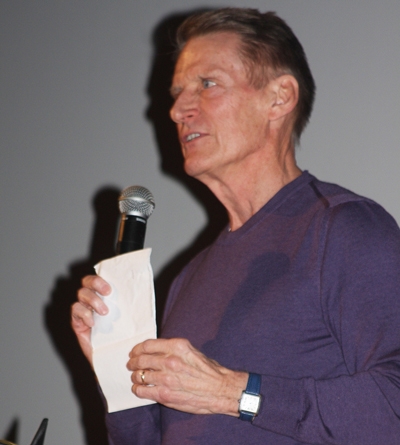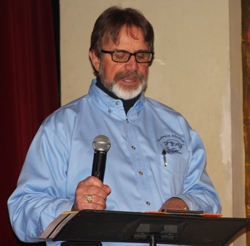If the turnout and applause Wednesday night at the Avalon Theatre in Easton for the screening of the documentary film, “The Anonymous People,” is a core sample of the Mid-Shore’s hunger for addressing addiction recovery issues, a historical moment may be at hand.
“Recovery for Shore,” an advocacy group networking Mid-Shore social services, health, mental health, business and non-profit organizations, as well as concerned citizens, offered the breakthrough film about addiction recovery as their first initiative.
Keith Richardson, Clinical Supervisor at Warwick Manor Behavioral Health in East New Market introduced the film to the 400 attendees. “We’re here because we want to help build a national and local addiction treatment advocacy,” he said. “We want people to feel that they can step out of the shadows of the old stigma and to feel good about their long term recovery.”
Addiction is a chronic brain disorder—not a behavioral problem— with an annual cost of $350 billion a year. Much of the public still views addiction as the result of poor choices, or a moral weakness. Science flatly disputes that interpretation.
“At its core, addiction isn’t just a social problem or a moral problem or a criminal problem. It’s a brain problem whose behaviors manifest in all these other areas,” says Dr. Michael Miller, past president of the American Society of Addiction Medicine, as quoted in Livescience.com.
Since the “Just Say No” War on Drugs campaign in the early 1980s, the criminalization of addiction has created the largest documented incarcerated group of citizens in the world with 65% of all US inmates meeting addiction criteria.
Historically the Recovery message has been overshadowed by the stigma of failure, shame and punishment. These powerful negative connotations, amplified by media images of the depraved addict, have kept many addicted people from seeking the treatment they need through professional addiction counseling, addiction treatment programs, or recovery groups like Alcoholic Anonymous and Narcotics Anonymous.
The film’s message rebukes the negative associations of addiction by empowering individuals in long term recovery to “go public” with their personal story to encourage active addicts to seek treatment.
With 23 million Americans now engaged in long-term recovery from alcohol and/or drugs, this powerful dynamic is emerging, one that emphasizes the success of recovery rather than just the horrors of addiction. Through the public sharing of personal stories, advocacy, community organizing and networking, the addict’s stigma of shame and criminality are being challenged and replaced by a new emphasis on the positive experience of long term recovery achieved by millions of people who live it every day.
“The Anonymous People” film was produced by manyfaces1voice.org, to help kick-start this new dialogue about addiction and is highlighted by individuals going public with their powerful message. Actress Kristen Johnson, former Miss USA Terra Conner, ex-NBA basketball star Chris Herren, a former Congressmen, and news anchor, among dozens, spoke unabashedly about their lives in long term recovery.
“This (addiction) is our black plague. It’s everyone’s problem. Two-thirds of American families are impacted by addiction,” say Kristen Johnson.
Even the linguistics of self-description are changing. Where one might have heard, “I’m an alcoholic,” one now will be hearing “I’m in long term recovery which means I haven’t had a drink in 5 years.” This reframing of self-identity underscore the positive message of recovery.
The film paid tribute to past mobilization efforts to address the stigma of addiction and honored the pioneering and ongoing work of Alcoholics Anonymous while not casting itself as contrary or alternative. The “manyfaces1voice.org campaign is not an alternative treatment program. It is rather a networking effort to send out a new message about addiction to erase the stigma and shame that hinder existent treatment and recovery opportunities.
At the end of the film, local Easton resident, Dr. David Hill, President and CEO of Hill Hospitality, took the stage to speak about his life in long-term recovery. “I would not be standing here before you today had I not found my way into treatment and embraced a life of long-term recovery.” he said.

Dr. David Hill spoke after the screening to support the film’s call for those in long-term recovery to speak out and advocate for more funding, resources and programs to support persons seeking to recover from alcohol and/or drug addiction.
Ex-NBA player Chris Herren notes, “I want people to know that long term recovery is cool and there’s no room for shame.”
It is cool. Let the shadows fall away.
The screening was sponsored by University of Maryland Shore Regional Health, Talbot Partnership for Alcohol and Other Drug Prevention, Talbot County Prevention Program, Mid-Shore Mental Health, Talbot County Department of Social Services, Rise Up Coffee, Washington Street Pub, Warwick Manor and Recovery for Shore.
More information about Recovery for Shore and how to get involved may be obtained by visiting the Recovery for Shore Facebook Page or contacting Sharon Dundon, CAC-AD, Addiction Specialist for UM Shore Regional Health and a key player on the Recovery For Shore steering committee, 410-822-1000, ext. 5452





Write a Letter to the Editor on this Article
We encourage readers to offer their point of view on this article by submitting the following form. Editing is sometimes necessary and is done at the discretion of the editorial staff.